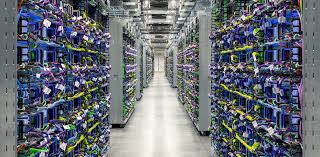Google announced an ambitious aim three years ago to combat climate change by becoming “net zero,” or eliminating all greenhouse gas emissions from the atmosphere by 2030.
However, a Tuesday report from the business indicates that it is far from achieving that objective.
In 2023, its emissions increased by 13% compared to the previous year, instead of decreasing. In contrast to 2019, the baseline year, emissions have increased by 48%.
Google attributed last year’s surge to artificial intelligence and the strain it places on data centers, which consume enormous quantities of electricity.
When coal or natural gas is used to produce power, greenhouse gases like carbon dioxide and methane are released into the atmosphere. These gases warm the earth and cause more intense weather.
The corporation is regarded as a leader in the industry and has made one of the biggest climate commitments.
According to Lisa Sachs, director of the Columbia Centre on Sustainable Investment, Google should invest in the electrical infrastructure and collaborate with greener businesses more.
“In terms of accelerating the transition, the truth is that we are far behind what we could be doing right now with the technology and resources that we have,” she remarked.
Google Chief Sustainability Officer Kate Brandt said, “Reaching this net zero goal by 2030 is an extremely ambitious.”
Laptops 1000Brandt continued, “We need to handle a lot of ambiguity, including this uncertainty regarding the future of AI’s environmental consequences. We realize this will not be easy and that our strategy will need to continue evolving.”
Some scientists claim that the entire shift to clean electricity—a crucial step in combating climate change—is in jeopardy due to the fast-growing data centers required to run AI.
This is because constructing a new data center may prevent the shutdown of an existing fossil fuel-burning power plant or delay its opening.
In addition to using a lot of energy, data centers also need high-voltage transmission lines and water to stay cool. They make noise as well.
They are frequently constructed in areas with the lowest cost of electricity, not in areas with significant renewable energy sources like solar and wind.
The International Energy Agency projects that the demand for AI and data center electricity worldwide may double by 2026.
The expansion of data centers poses a challenge to the sustainability objectives of other major IT companies.
In a May environmental sustainability report, Microsoft stated that they were the reason behind a 29% increase in emissions over its baseline for 2020.
Tech businesses argue that artificial intelligence AI including ChatGPT and other technologies, contributes and mitigates climate change.
Google’s use of data to forecast future flooding or optimize traffic flow could be example of this to save fuel consumption.
Those that utilize AI, whether big businesses or just one person creating memes, should use it responsibly, meaning they should only use it when it is beneficial to society, according to Amanda Smith, senior scientist at the climate NGO Project Drawdown.
Smith continued, “As humans, it is our responsibility to monitor what we do with it and to consider the reasons behind our actions.” “We can ensure that those demands will be satisfied by clean power sources when it is worth it.”
One reason for the increase in Google’s emissions last year was the company’s increased energy consumption of 25,910 gigawatt-hours, more than the previous year and twice as much as it was just four years prior.
The energy produced in an hour by a power plant that serves several hundred thousand households is approximately equal to one gigawatt-hour.
On the plus side, Google’s usage of renewable energy has increased along with its consumption.
The corporation declared in 2020 that by 2030, it will use entirely clean energy sources worldwide to meet its enormous demand for electricity.
According to Google, its data centers and offices worldwide used 64% carbon-free energy on average last year.
According to the corporation, on average, its data centers use 1.8 times less energy than other companies in the same industry.
Concerning the climate catastrophe, Sachs at Columbia University praised Google for its honesty and ambition, but expressed her wish that the company “would join us in a more rigorous conversation about how to accelerate” sustainable energy, “so that it doesn’t get much worse before it starts getting better.”

















